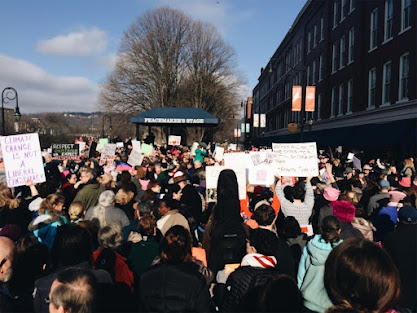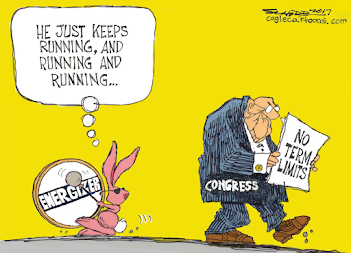Some Realities of Navigating Political Organizing as a Woman
By Annmarie Rounds-Sorensen | President 2021-2022
The women in my life taught me from a young age that I needed tough skin to get through life. My great-grandmother, my grandmother, and my mother have been my heroes for my entire life, and I consider myself supremely lucky to have them as my guideposts. I grew up watching them survive challenges I consider myself too weak to handle, and they shared their stories and advice with me. Now, when I am faced with seemingly unbearable situations, I have the tools to survive. As I grew up in less than favorable conditions, I found political organizing and activism to be a cathartic way to fight the barriers I saw not just for myself, but for those around me who had even less than I did. I saw up close when I was 17 at the New York City Women's March how huge our fight is. It reminded me of a Rupi Kaur poem.
"we all move forward when
we recognize how resilient
and striking the women
around us are"
Political organizing is deeply personal to me, just as it is important to all marginalized individuals. I look around just at the College Democrats at Penn State and I see struggles and pain, but I also see unmatched passion in this new generation of activists and organizers.
What not all young women in politics know is that they will soon be overwhelmed with pervasive misogyny and abuse by the men they will work with. We are surrounded by people seeking power rather than to better the lives of others when they enter politics. And while not all men are this way, so many of their role models are. The Cuomo family was a dynasty in New York politics, and it was only in 2020 that Governor Andrew Cuomo's routine abuse of women was exposed. He refused to resign and instead forced the state legislature to investigate his misconduct. President Joseph R. Biden was accused of sexually assaulting Tara Reade during his campaign. Survivors of sexual violence were expected to campaign for him, and if you didn't, you were ostracized. In the past year, I've made a concerted effort as a leader in the Democratic party to protect those around me from abusers. It's exhausting but necessary, because as Desmond Tutu once said, "When you are neutral in situations of injustice you have chosen the side of the oppressor."
So many Democrats speak about sexual and power-based violence like it's a problem unique to conservatives. And while it's true that conservatives are openly against protections for women and survivors, there are Democrats who benefit from the frameworks their political counterparts created for them. Within our own organization, I've had the displeasure of meeting three different men who used the College Democrats to abuse younger women while they sought and held leadership roles on our campus. And behind each of them was another group of men encouraging and enabling their behavior. What's worse is that I learned that not all women are quick to believe other women who speak up about violence either. These betrayals always hurt the worst. This work is scary. Speaking up knowing you will be gaslit, doubted, lied about, and hated is brave.
"She was powerful,
not because she wasn't scared
but because she went on
despite the fear"
- Atticus
All of this lurks beneath the surface while we phonebank, canvas, march, and speak about injustice in our society. All of this hangs above our heads when we sit in meetings and smile and make nice so we can be taken seriously. Not only are we already trying to meet the expectations society has for women in leadership and politics, but we are also trying to cope with being re-traumatized every single day. Women in politics who are angry are angry for a reason. The origins of modern law come from philosophers like Cicero, who deliberately discussed the law as a playground meant only for men. Every single space we exist in is built to silence us, so we have to scream and yell and cry before people will listen to us.
If you've made it here, I ask you to self-reflect. I encourage you to lift as you climb, to empower those around you, and to believe survivors when they share their experiences. Believing a survivor isn't just saying "I hear you." It's actively working to change the circumstances which allowed for the abuse to begin with.




Comments
Post a Comment